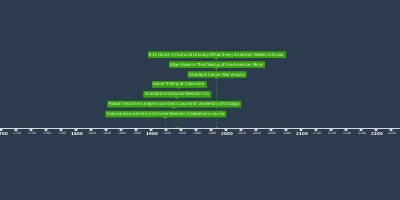feb 17, 1945 - Harvard GE Report
Description:
See the book from the same period by Harvard president, Connant, General Education in a Free Society in 1945, which is the report of their committee on general educationhttps://archive.org/details/generaleducation032440mbp/page/n6
Harvey Mansfield describes that Harvard was introducing GE in 1949 when he came as a freshman. (https://conversationswithbillkristol.org/transcript/harvey-mansfield-xviii-transcript/)
Harvey Mansfield: "And if you reread it [the report], as I did a while ago, you cannot help but be impressed with the level of argumentation. It mainly deals with what I think is a main issue in universities today, the relationship between science and humanities. And said Conant, he was Harvard President, but he’d been head of the Manhattan Program that had discovered the atomic bomb during World War II, and he appreciated the argument that took place among scientists. It was, again, this Nancy Hopkins argument, whether science should be let to run its course.
"And we should discover everything that we can discover. Or whether it should be controlled, guided by some principle. And then there were two principles – two competing principles. One was our national interest: win the war. And the other was the interest of humanity in not producing a weapon of, as we now say, “mass destruction,” that could eventually or quickly kill off all of humanity. So, out of that argument, Conant decided that Harvard needed to be devoted in good part to the connection between scientists and non-scientists.
"And that was why he wanted this program of general education, which would be liberal education. And I think that was [cross talk]. And as coming back to me as a freshman in 1949, I took a course which was taught by Conant called Natural Sciences IV, which was a kind of history of science course, which I considered different eras of science like Newtonian era, the Ptolemaic [phonetic] era, and so on. In order to get the essence of science, rather than to just learn what Physics was presently saying about the facts that it uncovers.
"And, funny thing is, among the teachers in that course, was a man named Thomas Kuhn, who later on in 1962, published a famous book called The Structure of Scientific Revolution, in which he gave a kind of politicized version of science. He said “science is characterized by normal science.” And normal science is the science of the present paradigm. Scientists don’t individually search out facts for themselves, but they always think in terms of some paradigm, like the Copernican paradigm, say, or the Newtonian paradigm.
"And everybody agrees with that until at a certain point someone comes up with a new paradigm. The only way the science progresses is through this new point of view. So you see how that’s connected to post-modernism."
Added to timeline:
Date:
feb 17, 1945
Now
~ 80 years ago
